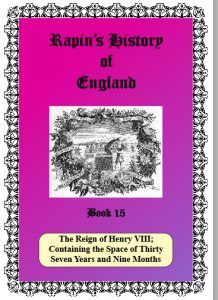BOOK XV
The Reign of Henry VIII; Containing the Space of Thirty Seven Years and Nine Months
Chapter I
HENRY VIII
1509
His Education
HENRY VIII, SON AND SUCCESSOR OF HENRY VII, came to the Crown at the age of eighteen years, wanting a few months[1]. The Lord Herbert, his Historian, says, the King his Father designed him at first for the Archbishopric of Canterbury, because having an elder Son, there was no likelihood that this would ascend the Throne. And therefore, continues he, care was taken to instruct him in all the parts of Learning necessary for a Prince that was one day to be a Churchman.
He would have spoken more justly, if he had only said, that Henry VII had such a design when he first put him upon his studies. But as the young prince was become his heir apparent at the age of eleven years, it could not be with the same view, that he caused him to pursue the study of such parts of learning as were proper for a clergyman. It is more likely therefore, that the King his father kept him to his studies, for fear his active and fiery spirit should carry him to more dangerous employments.
He was only son of Queen Elizabeth, heiress of the House of York. Consequently he might have given the King his father some trouble, had he thought of asserting his right as heir to his mother. However this be, Henry having taken a relish for learning in his younger years, preserved it ever after.
He always delighted in perusing good books, and conversing with the learned, even when the multitude of his affairs seemed to divert him from such kind of employments. By this means he made advances in the sciences very uncommon to great Princes. Francis I, his contemporary, stiled by the French historians, the father of the muses, was in learning much his inferior. He spoke French and Latin very well and readily. He was perfectly skilled in music, as two entire Masses composed by himself, and often sung in his chapel, do abundantly witness. He was exercised in the most abstruse points of the Aristotelian Philosophy, which alone was in vogue in those days (1503). But he applied himself chiefly to the study of Divinity, as it was then taught in the universities, all stuffed with useless questions. Thomas Aquinas’s Summary was his favourite book.
